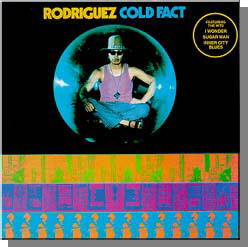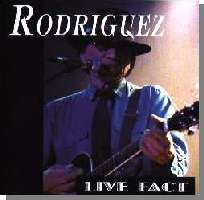Home
What's New
Introduction
The Man
The Myths
The Music
The Magic
The Memories
Musician Profile
by Nils van der Linden

Rodriguez is still a man shrouded in mystery. Despite a successful local tour in 1998, many South Africans still only know him as the man who sang the legendary "Sugarman" somewhere in the early 1970s and then disappeared without a trace.
Together with his legendary "Cold Fact" album, the reasons for the sudden disappearance became part of South African folklore. Some people claimed that Rodriguez had been burnt to death while performing. Others seemed convinced that he had murdered his wife and was now in jail, while further rumours stated that he had died of a heroin overdose. The most common belief, though, was that he had blown his head off, on stage, after reciting his famous words "Thanks for your time, and you can thank me for mine, and after that's said, forget it!"
The truth, however, is far less dramatic. Born Sixto Diaz Rodriguez in 1942 to Mexican immigrant parents living in Detroit, he received his name, pronounced 'Seez-toe', because he was their sixth child. His earliest musical memory is of playing the family guitar at the age of 16 — an experience that altered his life. It would be another nine years before the folk-influenced musician recorded five original songs for a local Detroit record label in 1967.  Unfortunately for the 25-year-old Rodriguez, the company was soon declared bankrupt and it took him a further two years to secure another record deal. The resulting album was entitled "Cold Fact" but sank without a trace in the United States and Europe in late 1969. An undaunted Rodriguez recorded a follow-up in London the following year, but "Coming From Reality" also failed to make much impact on the international music scene. As a result of this commercial failure, the artist seemed to disappear even as his debut album found an audience in Australia and New Zealand.
Unfortunately for the 25-year-old Rodriguez, the company was soon declared bankrupt and it took him a further two years to secure another record deal. The resulting album was entitled "Cold Fact" but sank without a trace in the United States and Europe in late 1969. An undaunted Rodriguez recorded a follow-up in London the following year, but "Coming From Reality" also failed to make much impact on the international music scene. As a result of this commercial failure, the artist seemed to disappear even as his debut album found an audience in Australia and New Zealand.
By 1971 "Cold Fact" reached South Africa, where Rodriguez's frank songs about drugs, social unrest, political apathy and general disillusionment were embraced by teenagers and national servicemen. "In the deadly South African '70s, his songs of harsh political complaint, of the power of sex and the lure of drugs, awoke something in untold thousands of young (white) breasts. He stoked rebellion and — who knows — helped children of suburbia wake up to the need for change in their own country," was how writer Guy Willoughby accounted for the impact of the album that has gone on to achieve platinum status in this country.
Although "Coming From Reality" was released locally in 1972 it failed to achieve the same cult acceptance. In 1976 the second album was reissued as "After the Fact" to capitalise on the success of his debut work, but that was more or less the last South Africans heard of the protest singer-songwriter. As the rumours about his demise began to circulate here, Rodriguez toured Australia in 1979 and 1981 before disappearing from the music scene without a trace.
Fuelled by folklore, "Cold Fact" continued its phenomenal local success, reaching a new generation of listeners when it was released on CD in 1991. "After The Fact" also received a new birth on compact disc and its reappearance in 1996 triggered a worldwide hunt for the missing legend by a few local fans. Within a year of intense searching, Sixto Rodriguez was found to be leading a quiet life in Detroit, seemingly oblivious of the stature he had attained in South Africa. In fact, at that stage all he possessed of his own recordings was a copy of 'Cold Fact' on a reel-to-reel tape.
Furthermore, he was described by his daughter Eva as a man who, during the past 20 years, had kept his hand and mind on music, but lived a surprisingly average and somewhat alternative life. "He raised three daughters, laboured, got an education, ran for political office and pays dues and debts like the rest of us."
Rodriguez himself turned out to be a very humble and reserved person who explained that as a musician he was "just your average guy with average talent." When asked how he had been keeping busy since recording his albums he evasively explained: "I've done a bit of this, a bit of that. I'm solid working class." He claimed that he mended roofs, built walls, and had worked in a petrol station but, apart from these odd jobs, he also obtained a BA in Philosophy from Detroit's Wayne State University in 1981. Despite a continuing interest in music, Rodriguez spent more time on social work. He participated in child development programmes as he "saw some things I thought people should be made aware of, but I was unable to do that with my music."
This was also one of the reasons why he made several forays in the field of politics, having been an unsuccessful candidate for various city and state political offices including those of city councillor and Mayor. In a recent interview published in the Mail and Guardian, Rodriguez explains that in his political career he hoped to bring about change. "I raise my hand for it, no matter how successful I am. There are many things I've seen that couldn't be said in music that needed direct involvement."
Despite the increase in political activity, the local icon states in the same interview, that he is always writing new songs but is unsure of how they are going to be released. He admits having recently turned down a record deal because of "an exploitative 'work for hire' clause the companies always put in a contract. If you sign it amounts to you acknowledging that the company wrote the songs. That was something I couldn't quite see past."
Although this news may be quite disappointing for South African fans hoping for a new Rodriguez album, his current 16 date national tour should help to keep his legendary name alive.
Discography
Cold Fact
Coming From Reality/After The Fact
The Best of Rodriguez
Live Fact
For additional information on the legend visit the Internet's most comprehensive Rodriguez website at www.sarockdigest.com/rodriguez
Nils van der Linden, Iafrica.com website, September 2001
Quick links |





